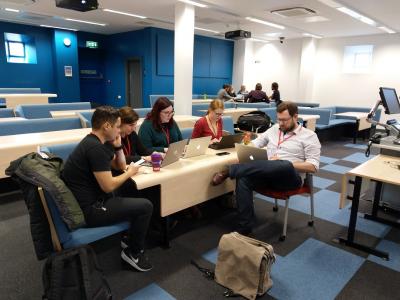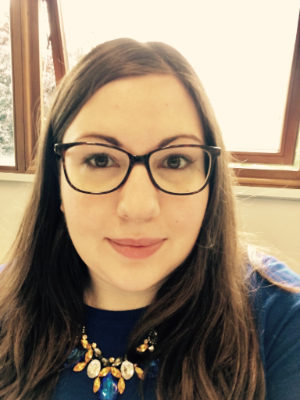Being a Digital Humanist in 2020
Posted on 16 December 2020
Being a Digital Humanist in 2020
 Emily (centre) at the Collaborations Workshop 2019
Emily (centre) at the Collaborations Workshop 2019
By Emily Bell, Postdoctoral Research Fellow in English, University of Leeds.
Digital humanities (DH) can be a difficult field to break into. For a long time, I was an aspirational digital humanist rather than an actual one; I had some skills and a lot of enthusiasm, but very little research or teaching experience in this area. My background is in literary studies and history; it took an exciting postdoctoral opportunity to become part of an existing, multinational, multidisciplinary research project, Oceanic Exchanges, for me to become a fully-fledged digital humanist. A key part of DH is collaboration, as most successful projects involve a team working across disciplines, bringing different skills to shared research questions. But when you’re on the outside looking in, it’s difficult to know where to begin, how to network, or how even to get a foot in the door when you don’t feel as if you have much to offer yet. The Software Sustainability Institute has been a huge part of my development, from my first Collaborations Workshop in 2019 to my 2020 fellowship, and it offers digital humanists the ideal conditions to thrive – a supportive, creative environment to make connections, enhance their training, and develop new communities.
SSI Fellowship in a Pandemic
2020 has been a strange year to start an SSI fellowship. Before the pandemic, I’d been planning to use the SSI’s support to attend the two-week Digital Humanities Summer Institute at the University of Victoria, Canada, taking one course on digital humanities pedagogy to refine the way I teach these skills to others and another to enhance my coding. As well as several conferences I wanted to attend to network and get feedback on my research, I’d also been developing a series of events focusing on software and programming skills development in Victorian studies, including a roundtable on digital editing projects and a multi-day training event. Something that continues to frustrate me is the duplication of effort across, and lack of communication between, DH projects. Many researchers feel the need to reinvent the wheel, as they’re simply not aware of the excellent work being done in other areas. I hoped to bring project leaders and people just getting started together, in person, to share their learning.
… And then the world changed, in ways that nobody really foresaw. Obviously, these things haven’t been able to take place in the way I planned, but I’m still proud of the things I have achieved this year as a Fellow. It was wonderful to meet the rest of the new cohort of Fellows in February at the Inaugural Meeting, and to discuss people’s initial ideas for forming new communities of practice and advocating for better software in their fields. As in previous years, there’s a strong group of DH scholars in the cohort, from archivists to academics, but one of the great strengths of the fellowship programme is the sharing of ideas across disciplines and subject areas. The SSI has adapted particularly well to the pandemic, with monthly community calls taking place on Zoom for Fellows to talk about what they’ve been doing, any questions or issues they’ve faced, and generally catch up.
The Collaborations Workshop 2020 took place online – one of the first online events of this kind I’d ever attended, but now a familiar format for most of us – and managed to capture so much of what is great about the annual workshop. This included networking sessions using Zoom breakout rooms, diverse conversations on Slack, and a welcoming, inclusive atmosphere. A couple of months later, I co-hosted a virtual conference, #Dickens150, which took inspiration from the SSI’s exciting and accessible model. The SSI set the bar high for online events, and took the lead when most of us were still finding our feet and discovering new ways of working and connecting remotely. The commitment to open scholarship has also meant that the SSI have shared their resources very generously, not just among fellows but more widely, and you can access the newly released Software Sustainability Institute Event Organisation Guide here.
Open Scholarship, Academic Kindness
While 2020 has brought many severe challenges, there have also been opportunities for openness and generosity. The inability to get into archives has made it more important than ever for researchers to use software and digital archives in their research, giving DH projects higher visibility and a greater ability to make a difference. Many online conferences have had roundtables, panels and demonstrations to show what can be done with research software to overcome some of the difficulties we’re currently facing. The pandemic has also created an environment where people are more open to the possibilities of digital humanities, and has brought out a lot of good from many people and institutions, with more scholarship made open and more events and training offered for free. For example, this year I’ve given papers at the virtual DHSI Colloquium and DH2020, I’ve undertaken a course of Python for Linguists and Humanists run for free by Cody Kingham using Slack, and I’ve attended free Zoom workshops run by the COVE project, led by Dino Felluga, which offers a brilliant tool for Victorianists teaching with online editions.
The SSI has also reflected this generous approach, giving support in running two online workshops about The Atlas of Digitised Newspapers and Metadata, which I co-authored with another SSI Fellow, Melodee Beals. The Atlas offers a guide to ten collections of digitised newspapers around the world, aiming to show archivists, librarians and researchers across literature, history and computer science what metadata is available in collections and give historical context, a history of each database, and (we hope) the necessary tools to develop new ways into the collections. The report has been published open access, and thanks to the SSI we were able to bring together researchers from different backgrounds to discuss the future of digitised collections in the workshops. Borrowing from the SSI’s speed blogging model, we have published some of the discussions as blog posts on our website.
I’m hoping that it will be possible in 2021 to hold some of my postponed events in person; if not, the SSI has shown how well things can be done remotely, and continues to offer support in developing contingency plans. 2020 has been a difficult year, but being part of the SSI has been a highlight –– and I’m all the more grateful that being an SSI Fellow is not just a one-year opportunity, but a lasting connection. I thoroughly recommend applying to the scheme, and prospective applicants are welcome to make contact with me on Twitter if they have any questions about applying as a digital humanist.
Become an SSI Fellow
Applications are open for the Fellowship Programme 2021 until 5 February 2021. For more information and to apply, visit the Fellowship Programme page.

